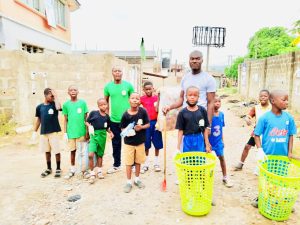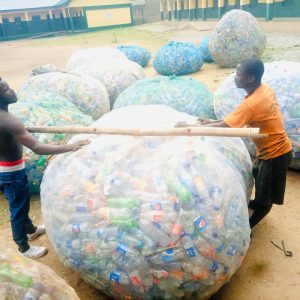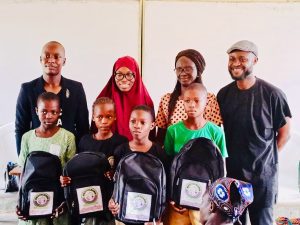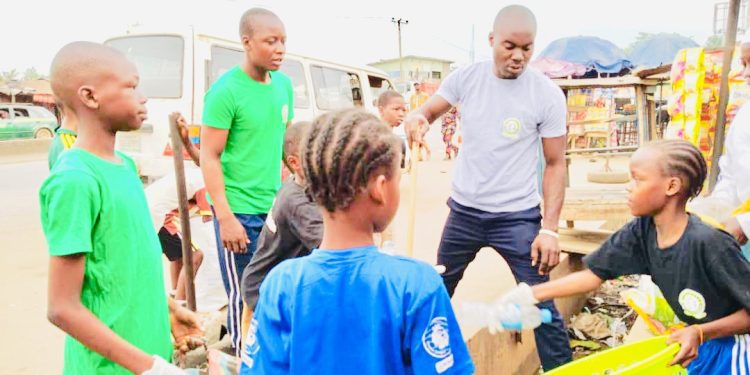When Abdulrasak Kazeem, a geospatial analyst, was selected as one of the fellows for Teach for Nigeria in 2020, he was joyous he reported to his duty post in Abeokuta, Ogun State the next day. However, his joy was short-lived. From the very first day, he and other fellows encountered several challenges.
“I felt so disappointed at the state of things in the school and I was dejected when another fellow reported that there were no learning or teaching materials. Imagine when you have 87 students in the class, but only four of them have the recommended English textbooks, that’s so bad!” he decried.
As a fellow of Teach for Nigeria, Kazeem and other fellows were responsible for equipping young minds with sound education in underserved communities across the country. Responsible for complementing the effort of government-employed teachers in under-resourced public schools, each fellow is required to teach at least three primary schools subjects like numeracy, literacy and basic science. Kazeem teaches about 46 pupils in Ebenezer African Church Primary School, Ita Oshin in Abeokuta North Local Government, Ogun State.
The potential for success is however very slim when there is no access to learning materials. To address the challenge, Kazeem initiated a social media campaign; soliciting for money and books to aid teaching and learning for the children. But his effort recorded insubstantial results, and with no teaching materials, hardly was any learning taking place.
Amidst the poor reading culture in Nigeria, the National Commission for Mass Literacy, Adult and Non-Formal Education (NMEC) lamented that only 38% of the adult population in the country is non-literate. This is as the country contributes 20 million people to the global rate of out-of-school children according to a report published by the United Nations Educational, Scientific and Research Council (UNESCO). As experts have posited, there might be a risk of insecurity if young children still drop out of school hence the need for a remedy.
But for the low-income communities in the rural parts of Ogun State, access to quality education is often crippled by inadequate learning resources. Even in school, this difficulty makes effective teaching, if available at all, seem uninteresting. Meanwhile, an initiative is changing the narrative.
Could Another Approach Be Sustainable?
Established in October 2021 as a non-profit organization that uses recycling as a weapon to address the issue of low quality in Ogun State, the Recyclearn Initiative works daily, going from one street to the other for a plastic collection drive. Partnering with the management of about five schools in the state, it arranges selected students who work with its team members to pick up plastic bottles.

Kazeem, who founded the initiative, told BONews Service that he was able to secure some empty classes in some of the schools from their management as stores for the plastics. After this has become a large heap, a recycling company would come to buy them. It was the earnings from here that Kazeem and his team are using now to provide educational support to the pupils. Since inception, about 575 students have benefited and they are now targeting about five schools in different communities to be in up-scaling mode.
The nonprofit gives a report of its activities to community leaders during stakeholders’ meetings in a bid to ensure a sense of belonging so that they know what their mission is. This is because most of them are concerned about the pupils who picked bottles while in school uniforms. Not only this, the nonprofit has partnered with the Ogun State Universal Basic Education Board for legal support.
“Bearing in mind that plastic waste is a major contributor to climate change, we all need to put our hands together at a roundtable. I made their parents understand that their collaboration against low-quality education is also required to pose the children as climate solutions providers to bring an end to the crisis,” he said.
With a team of 20 members, Recyclearn launched a weekly sanitation drive for about 10 communities such as Ita-Oshi, Adatan, Ikenne, Owode and Ita-Iyalode among others in the state and it was during this they gathered the plastics. The nonprofit distributes the purchased materials anytime they make a new sale and this is usually based on needs’ assessment – “a pupil who needs pairs of sandals will not be given a bag.”
Gabriel Kwaghtsa, one of the Program Coordinators of the nonprofit, noted that there will be more security threats with moral values endangered in the society if young children are out of school. Hence, there is a “need to invest more in education” according to him.
Narrating how he coordinated the pupils every Monday morning for about 30 minutes before the school hours commence, he added that he thinks “the new initiative will transform the pupils better as education is the bedrock of the nation.” Now, Kwaghtsa is planning on extending the outreach to Benue State where he hails from.
“The approach is motivating because all the stakeholders have started to come back with impressive testimonies, especially the positive change in the academic status of their teenagers. It has also reduced the burden economically on the side of the parents due to the fact that the learners don’t disturb them for learning [materials],” he said.

Learning Takes A New Dawn
Adelani Hibatullahi, aged 10, was in primary six but her academic pursuits deteriorated when her father, a motor mechanic, had difficulties in purchasing the needed learning resources for her forthcoming first-school leaving examination (common entrance). Left with no choice, she managed to come to school but with a sad heart until Kazeem (who was one of her teachers) organized an awareness campaign in the school, which gave her what she lacked after she did what they required.
“I can’t study well without textbooks, this takes a toll on my studies. This initiative has come to help in the sense that I can get many learning materials to such a great extent immediately after I provide the plastic bottles. To get more, I tried to convince my mother to help me gather some too and now, we’re both picking it together,” she told this reporter.
Speaking further, said: “I wish to help people too in the future if I have the means. I feel like I shouldn’t graduate from this school because I don’t want to miss the collection. I like to coordinate. I recommended Roqeeb to him even though he is from another school. Although we could only access the books through our class teacher, we were also given a free bag. We, pupils, are happy to bring more friends in so that they can enjoy what we took.”
Narrating that his results have taken a positive turn, Akinde Sodeeq, one of the beneficiaries, said he could not concentrate much on school earlier because there were no materials to learn with. The 13-years old described what happened to him after RecycLearn’s intervention as “impactful and impressive” because it “has helped” his education.
Oluwasegun Christianah shared how her life takes a new turn with the provision of materials that are requisite for her studies while in school. She noted that the monthly income of her father who works as a driver could not sustain the basic needs of the family let alone support her in school.
“School is a dull life until I have this bag and other textbooks, I can now read something every night now. ”

A Misconstrued Concept
Beaming with a smile, Azeezat Adelani (Hibatullahi’s mother), in her late thirties, told BONews Service she was taken aback when her daughter brought some new books to her room. Although she was aware of the whole idea, she didn’t completely like it because she initially perceived it as a form of ‘child exploitation.’ She nearly beat her daughter after months of taking bottles to school but returned with nothing.
At first, Wahab Balikis, aged 76, felt picking bottles from the street in exchange for learning resources was a waste of time until her granddaughter came home with textbooks.
“I thought the teacher was just wasting the time of the children, so I nearly cursed him. But now, I am very happy with what they (Recyclearn) are doing,” she said with joy,” said the septuagenarian.
Like Azeezat and Balikis, almost all the residents thought the same thing. Their misconstruction about the works of Recyclearn Initiative is so clear that they sneer at its team members whenever they are in the town for sanitation or waste collection.
Expert Weighs In
“This initiative by this nonprofit organization can boost the economy. Our country is experiencing economic hardship mainly because we have ignored the manufacturing sector like recycling. Our imports are high whereas we have things we can reproduce ourselves. The government needs to collaborate with nonprofits to control the climate crisis and increase the wealth of the nation,” said Salaudeen Saheed, a Lecturer of Economics at the Federal Polytechnic Ede, Osun State.
According to the United States Environmental Protection Agency, recycling means the process of collecting and processing materials that would otherwise be thrown away as trash and turning them into new products. A study conducted by the Conserve Energy Future revealed that recycling is one of the best ways to reduce environmental pollution.
But There Are Barricades
Distrust is a major hitch affecting the nonprofit from expanding its outreach. “Sometimes, the recycling companies will not just show up or if they do, they will offer us a low amount from what we earlier pegged our negotiation at,” the Founder told this reporter.
Another challenge is the lack of cooperation from the community leaders. Kazeem was so embittered one day when a woman challenged him, claiming that he is using the children for another thing and not what he preached around. “Low cooperation is a big problem for us,” he said.
Meanwhile, Azeezat and Balikis are now helping their children to keep the thrash after they have seen the results.
This story has been made possible by Nigeria Health Watch with support from the Solutions Journalism Network, a nonprofit organization dedicated to rigorous and compelling reporting about responses to social problems.

